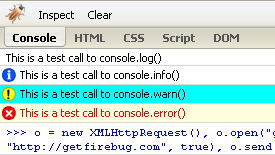Overview
This version was conceived to put the Firebug Lite in a new level, by allowing code reuse from Firebug's original source. A new core was created to accomplish the following goals:
Performance - the core of Firebug Lite 1.3 was rewritten from scratch taking the performance into account in the first place.
Modularity - the code is now more modular, making easier the process of adding new features and UI components such as panels, buttons, menus etc. The modularity also helps the development process. Once the modules can be isolated it is easier to detect the cause of complicated problems like memory leaks.
Shared code - the core was designed to make it possible to port some code directly from the Firebug source, with as few as possible modifications. As a result, some features and UI elements behave exactly as in Firebug.
Compatibility - the new core is compatible with XHTML and XML+XSL documents. Thanks to the new context-independent approach, it supports now the experimental persistent popups feature (popups that "live" across different page loads of the same domain), and will support cross-iframe inspection in the next version.
